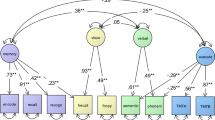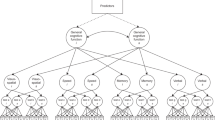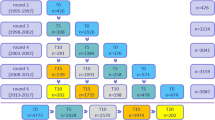Abstract
Objective
To examine associations of plasma folate concentrations and risk of global and domain-specific cognitive decline in older people.
Methods
Data of 3140 participants from The Irish Longitudinal Study on Ageing (TILDA), a nationally-representative cohort of adults aged ≥50 years were used over 8-year follow-up. Biannual cognitive assessments included the Mini-Mental State Examination (MMSE), verbal fluency and immediate and delayed word recall tests (Waves 1–5) and the Montreal Cognitive Assessment, (MoCA) (Waves 1 and 3). Plasma folate concentrations were measured in stored blood collected at baseline. Mixed effects Poisson and linear regression determined associations between baseline folate concentrations and cognition.
Results
In multivariable-adjusted models of those aged ≥50 years at baseline, low folate at baseline (<11.2 nmol/L) was associated with higher proportions of MMSE errors (incidence rate ratio [IRR] = 1.10; 95% confidence interval [CI] (1.00, 1.21), lowest vs. highest quintile) over 8 years. Plasma folate <21.8 nmol/L predicted declines in episodic memory for immediate (beta [β] = −0.26; 95% CI (−0.48, −0.03), β = −0.29; 95% CI (−0.50, 0.08) and β = −0.29; (−0.50, −0.08), for lowest three vs. highest quintile) and delayed recall (β = −0.20; 95% CI (−0.38, −0.01), β = −0.18; 95% CI (−0.37, −0.01) and β = −0.19; (−0.36, −0.01) lowest three vs. highest quintile). There were no significant associations in a subsample aged ≥65 years.
Conclusion
In those aged ≥50 years, lower concentrations of folate may have differential relationships with cognitive domains. Folate <11.2 nmol/L predicted a decline in global cognitive function, while <21.8 nmol/L predicted poorer episodic memory. Low folate was associated with accelerated decline in cognitive function and is an important marker for cognitive decline among older people.
This is a preview of subscription content, access via your institution
Access options
Subscribe to this journal
Receive 12 print issues and online access
$259.00 per year
only $21.58 per issue
Buy this article
- Purchase on Springer Link
- Instant access to full article PDF
Prices may be subject to local taxes which are calculated during checkout

Similar content being viewed by others

References
Wu YT, Beiser AS, Breteler MM, Fratiglioni L, Helmer C, Hendrie HC, et al. The changing prevalence and incidence of dementia over time—current evidence. Nat Rev Neurol. 2017;13:327–39.
Blazer DG, Yaffe K, Liverman CT. Cognitive aging: progress in understanding and opportunities for action. Washington, DC: National Academies Press; 2015.
Shannon OM, Stephan BC, Granic A, Lentjes M, Hayat S, Mulligan A, et al. Mediterranean diet adherence and cognitive function in older UK adults: the European prospective investigation into cancer and Nutrition–Norfolk (EPIC-Norfolk) study. Am J Clin Nutr. 2019;110:938–48.
Gillette‐Guyonnet S, Secher M, Vellas B. Nutrition and neurodegeneration: epidemiological evidence and challenges for future research. Br J Clin Pharm. 2013;75:738–55.
Scarmeas N, Anastasiou CA, Yannakoulia M. Nutrition and prevention of cognitive impairment. Lancet Neurol. 2018;17:1006–15.
Santos CY, Snyder PJ, Wu WC, Zhang M, Echeverria A, Alber J. Pathophysiologic relationship between Alzheimer’s disease, cerebrovascular disease, and cardiovascular risk: a review and synthesis. Alzheimer’s Dement: Diagnosis, Assess Dis Monit. 2017;7:69–87.
Hooshmand B, Mangialasche F, Kalpouzos G, Solomon A, Kåreholt I, Smith AD, et al. Association of vitamin B12, folate, and sulfur amino acids with brain magnetic resonance imaging measures in older adults: a longitudinal population-based study. JAMA Psychiatry. 2016;73:606–13.
Luciano M, Corley J, Cox SR, Hernández MCV, Craig LC, Dickie DA, et al. Mediterranean-type diet and brain structural change from 73 to 76 years in a Scottish cohort. Neurology. 2017;88:449–55.
Smith AD, Smith SM, De Jager CA, Whitbread P, Johnston C, Agacinski G, et al. Homocysteine-lowering by B vitamins slows the rate of accelerated brain atrophy in mild cognitive impairment: a randomized controlled trial. PloS ONE. 2010;5:e12244.
Pusceddu I, Herrmann M, Kirsch SH, Werner C, Hübner U, Bodis M, et al. One-carbon metabolites and telomere length in a prospective and randomized study of B-and/or D-vitamin supplementation. Eur J Nutr. 2017;56:1887–98.
Smith AD, Refsum H, Bottiglieri T, Fenech M, Hooshmand B, McCaddon A, et al. Homocysteine and dementia: an international consensus statement. J Alzheimer’s Dis. 2018;62:561–70.
Smith AD, Refsum H. Homocysteine, B vitamins, and cognitive impairment. Ann Rev Nutr. 2016;36:211–39.
Quadri P, Fragiacomo C, Pezzati R, Zanda E, Forloni G, Tettamanti M, et al. Homocysteine, folate, and vitamin B-12 in mild cognitive impairment, Alzheimer disease, and vascular dementia. Am J Clin Nutr. 2004;80:114–22.
Ramos MI, Allen LH, Mungas DM, Jagust WJ, Haan MN, Green R, et al. Low folate status is associated with impaired cognitive function and dementia in the Sacramento Area Latino Study on Aging. Am J Clin Nutr. 2005;82:1346–52.
Ravaglia G, Forti P, Maioli F, Martelli M, Servadei L, Brunetti N, et al. Homocysteine and folate as risk factors for dementia and Alzheimer disease–. Am J Clin Nutr. 2005;82:636–43.
Tucker KL, Qiao N, Scott T, Rosenberg I, Spiro A III. High homocysteine and low B vitamins predict cognitive decline in aging men: the Veterans Affairs Normative Aging Study–. Am J Clin Nutr. 2005;82:627–35.
Tettamanti M, Garrì MT, Nobili A, Riva E, Lucca U. Low folate and the risk of cognitive and functional deficits in the very old: the Monzino 80-plus study. J Am Coll Nutr. 2006;25:502–8.
Kim JM, Stewart R, Kim SW, Shin IS, Yang SJ, Shin HY, et al. Changes in folate, vitamin B12 and homocysteine associated with incident dementia. J Neurol, Neurosurg Psychiatry. 2008;79:864–8.
Michelakos T, Kousoulis AA, Katsiardanis K, Dessypris N, Anastasiou A, Katsiardani KP, et al. Serum folate and B12 levels in association with cognitive impairment among seniors: results from the VELESTINO study in Greece and meta-analysis. J Aging Health. 2013;25:589–616.
Ma F, Wu T, Zhao J, Ji L, Song A, Zhang M, et al. Plasma homocysteine and serum folate and vitamin B12 levels in mild cognitive impairment and Alzheimer’s disease: a case-control study. Nutrients 2017;9:725.
Kado DM, Karlamangla AS, Huang MH, Troen A, Rowe JW, Selhub J, et al. Homocysteine versus the vitamins folate, B6, and B12 as predictors of cognitive function and decline in older high-functioning adults: MacArthur Studies of Successful Aging. Am J Med 2005;118:161–7.
Reynolds EH. Folic acid, ageing, depression, and dementia. Bmj 2002;324:1512–5.
Pfeiffer CM, Caudill SP, Gunter EW, Osterloh J, Sampson EJ. Biochemical indicators of B vitamin status in the US population after folic acid fortification: results from the National Health and Nutrition Examination Survey 1999–2000–. Am J Clin Nutr. 2005;82:442–50.
Clarke R, Grimley Evans J, Schneede J, Nexo E, Bates C, Fletcher A, et al. Vitamin B12 and folate deficiency in later life. Age Ageing. 2004;33:34–41.
Hopkins SM, Gibney MJ, Nugent AP, McNulty H, Molloy AM, Scott JM, et al. Impact of voluntary fortification and supplement use on dietary intakes and biomarker status of folate and vitamin B-12 in Irish adults. Am J Clin Nutr. 2015;101:1163–72.
Laird EJ, O’Halloran AM, Carey D, O’Connor D, Kenny RA, Molloy AM. Voluntary fortification is ineffective to maintain the vitamin B12 and folate status of older Irish adults: evidence from the Irish Longitudinal Study on Ageing (TILDA). Br J Nutr. 2018;120:111–20.
Donoghue OA, McGarrigle CA, Foley M, Fagan A, Meaney J, Kenny RA. Cohort profile update: the Irish longitudinal study on ageing (TILDA). Int J Epidemiol. 2018;47:1398–l.
Folstein ME. A practical method for grading the cognitive state of patients for the children. J Psychiatr Res. 1975;12:189–98.
Nasreddine ZS, Phillips NA, Bédirian V, Charbonneau S, Whitehead V, Collin I, et al. The Montreal Cognitive Assessment, MoCA: a brief screening tool for mild cognitive impairment. J Am Geriatr Soc. 2005;53:695–9.
O’Halloran AM, Laird EJ, Feeney J, Healy M, Moran R, Beatty S, et al. Circulating Micronutrient Biomarkers Are Associated With 3 Measures of Frailty: Evidence From the Irish Longitudinal Study on Ageing. J Am Med Dir Assoc. 2020;21:240–7.
Molloy AM, Scott JM. Microbiological assay for serum, plasma, and red cell folate using cryopreserved, microtiter plate method. Methods Enzymol. 1997;281:43–53.
Kelleher BP, Broin SD. Microbiological assay for vitamin B12 performed in 96-well microtitre plates. J Clin Pathol. 1991;44:592–5.
Craig CL, Marshall AL, Sjöström M, Bauman AE, Booth ML, Ainsworth BE, et al. International physical activity questionnaire: 12-country reliability and validity. Med Sci Sports Exerc. 2003;35:1381–95.
Briggs R, Carey D, O’Halloran AM, Kenny RA, Kennelly SP. Validation of the 8-item Centre for Epidemiological Studies Depression Scale in a cohort of community-dwelling older people: data from The Irish Longitudinal Study on Ageing (TILDA). Eur Geriatr Med. 2018;9:121–6.
Lezak MD, Howieson DB, Loring DW, Fischer JS. Neuropsychological assessment. USA: Oxford University Press; 2004.
Rossetti HC, Lacritz LH, Cullum CM, Weiner MF. Normative data for the Montreal Cognitive Assessment (MoCA) in a population-based sample. Neurology. 2011;77:1272–5.
Twisk JW Applied mixed model analysis: a practical guide. Cambridge University Press; 2019.
Allen LH. Causes of vitamin B12 and folate deficiency. Food Nutr Bull. 2008;29:S20–S34.
Qiu W, Gobinath AR, Wen Y, Austin J, Galea LAM. Folic acid, but not folate, regulates different stages of neurogenesis in the ventral hippocampus of adult female rats. J Neuroendocrinol. 2019;31:e12787.
Kruman II, Mouton PR, Emokpae R Jr, Cutler RG, Mattson MP. Folate deficiency inhibits proliferation of adult hippocampal progenitors. Neuroreport. 2005;16:1055–9.
Squire LR. Memory and the hippocampus: a synthesis from findings with rats, monkeys, and humans. Psychol Rev. 1992;99:195.
den Heijer T, Vermeer S, Clarke R, Oudkerk M, Koudstaal P, Hofman A, et al. Homocysteine and brain atrophy on MRI of non‐demented elderly. Brain 2002;126:170–5.
de Jager CA, Oulhaj A, Jacoby R, Refsum H, Smith AD. Cognitive and clinical outcomes of homocysteine‐lowering B‐vitamin treatment in mild cognitive impairment: a randomized controlled trial. Int J geriatr Psychiatry. 2012;27:592–600.
Durga J, van Boxtel MP, Schouten EG, Kok FJ, Jolles J, Katan MB, et al. Effect of 3-year folic acid supplementation on cognitive function in older adults in the FACIT trial: a randomised, double blind, controlled trial. Lancet 2007;369:208–16.
Walker JG, Batterham PJ, Mackinnon AJ, Jorm AF, Hickie I, Fenech M, et al. Oral folic acid and vitamin B-12 supplementation to prevent cognitive decline in community-dwelling older adults with depressive symptoms—the Beyond Ageing Project: a randomized controlled trial. Am J Clin Nutr. 2012;95:194–203.
Clarke R, Bennett D, Parish S, Lewington S, Skeaff M, Eussen SJ, et al. Effects of homocysteine lowering with B vitamins on cognitive aging: meta-analysis of 11 trials with cognitive data on 22,000 individuals. Am J Clin Nutr. 2014;100:657–66.
Ford AH, Almeida OP. Effect of vitamin B supplementation on cognitive function in the elderly: a systematic review and meta-analysis. Drugs Aging. 2019;36:419–34.
Jernerén F, Elshorbagy AK, Oulhaj A, Smith SM, Refsum H, Smith AD. Brain atrophy in cognitively impaired elderly: the importance of long-chain ω-3 fatty acids and B vitamin status in a randomized controlled trial. Am J Clin Nutr. 2015;102:215–21.
Lefèvre-Arbogast S, Féart C, Dartigues J-F, Helmer C, Letenneur L, Samieri C. Dietary B vitamins and a 10-year risk of dementia in older persons. Nutrients 2016;8:761.
O’Connor DM, Laird EJ, Carey D, O’Halloran AM, Clarke R, Kenny RA, et al. Plasma concentrations of vitamin B 12 and folate and global cognitive function in an older population: cross-sectional findings from The Irish Longitudinal Study on Ageing (TILDA). Br J Nutr. 2020;124:602–10.
Acknowledgements
The authors would like to acknowledge the contribution of the participants in the study, members of the TILDA research team, study nurses and administrative team. This work was supported by the Irish Department of Agriculture, Food and the Marine through the grant 13F492: The Nutritional Biomarker Database Enhancement Initiative of (“BIO-TILDA” 2013–2015). Original funding for TILDA was provided by The Atlantic Philanthropies, the Irish Government and Irish Life plc.
Funding
The sponsors played no role in designing or conducting the study or in the collection, management, analysis or interpretation of the data, nor did they have any input into the preparation, review or approval this paper.
Author information
Authors and Affiliations
Contributions
DMAO’C, CAMcG, RAK: Conception of research and study design. DMAO’C, SS, CDL, CAMcG: Analysis and interpretation of data. DMAO’C, SS, CAMcG: Preparation of paper DMAO’C, SS, CDL, AMO’H, EL, AMM, RC, CAMcG, RAK: Critical revision of paper. DMAO’C, CAMcG, RAK: Final approval for publication.
Corresponding author
Ethics declarations
Competing interests
The authors declare no competing interests.
Additional information
Publisher’s note Springer Nature remains neutral with regard to jurisdictional claims in published maps and institutional affiliations.
Rights and permissions
About this article
Cite this article
O’Connor, D.M.A., Scarlett, S., De Looze, C. et al. Low folate predicts accelerated cognitive decline: 8-year follow-up of 3140 older adults in Ireland. Eur J Clin Nutr 76, 950–957 (2022). https://doi.org/10.1038/s41430-021-01057-3
Received:
Revised:
Accepted:
Published:
Issue Date:
DOI: https://doi.org/10.1038/s41430-021-01057-3
This article is cited by
-
The association between altitude and serum folate levels in Tibetan adults on the Tibetan plateau
Scientific Reports (2022)


